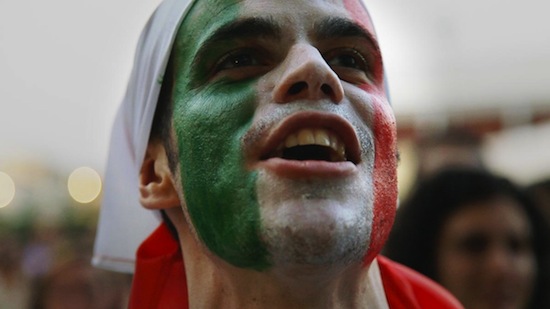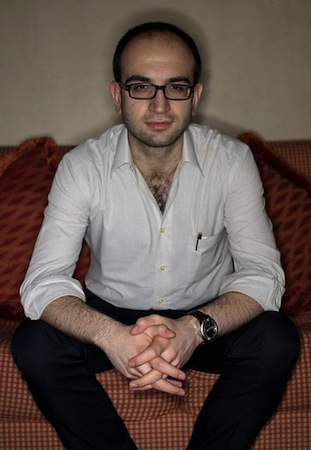
There is a collective question currently being asked around the world: What does it mean to belong to a country, to be a certified, true citizen somewhere?
Haider Rashid, a multicultural filmmaker who was born in Florence of an Iraqi father and an Italian mother, asks that question in his new film It's About to Rain, and in the process raises many more. To Rashid, Italy is home. Yet his worldliness is undeniable, from his knowledge of several languages to his insights on both Italy and the Arab world. Rashid also touches on what seems to be a trend in today's world -- understanding deeply the plight of those fitting in everywhere but never truly belonging anywhere.
For me personally, born in Italy of German and Italian parents, having lived most of my adult life in the United States, writing about films from India and the Middle East, the entire world and no place at all feel like home -- depending on which day you ask. It's no coincidence that after watching It's About to Rain in Dubai, during the recent Gulf Film Festival, the film stayed with me, raised many inner discussions and needed a second viewing to fully sink in.
Luckily, I ended up watching Rashid's film again in Rome, where It's About to Rain is enjoying a theatrical run at the moment. It felt good to be among Italians who understood the issues so well. And even better to, afterward, get to ask Rashid a few questions about what inspired his film, what it means to be Italian, but also how come the story of It's About to Rain translates so perfectly to the issues currently raised in the U.S. by the new immigration bills.
How did the idea for your film come about?
Haider Rashid: It's a subject I have thought about for a long time. My next film Babylon was actually written two years ago and focuses on a second generation Iraqi-born, bred in Italy. So when I decided to put it aside and make a smaller film I thought it would be interesting to tell the story of a young man having issues with his lack of citizenship. Initially it was meant to be a film about an eighteen-year-old's last available day to apply for citizenship -- people born in Italy from immigrant parents can only apply for citizenship between the age of 18 and 19 and must prove that they have resided in the country their whole life -- but I later thought it would be interesting to enrich the story with more mature characters and their family's past and present struggles. The idea for the film was born as a bet between Masoud Amralla Al Ali -- the artistic director of the Dubai Film Festival -- and myself. Last May, during a casual lunch we were having at the Cannes Film Festival, he dared me to make a film in time for his festival in December. With pride and perhaps stupidity, I agreed. He noted it down on his calendar, while friends around me were telling me "you're getting into trouble, don't do this." And you just don't escape a promise made to Masoud easily, he is determined and serious, especially when it comes to filmmakers and their films. The deadline was August 7th; I gave him a rough cut by September 7th, and in December we premiered the film in Dubai. When I saw him at the festival I ran and hugged him, even if we had been far apart, it was like he was on set with me. He tried to make me promise I'd give him a new film this year, but I'm not sure I could pull it off once again in such a short time.
How much of you is in the lead character Said? And where do your stories differ?
 HR: I feel close to Said's determination, to his will to fight against what he believes is wrong, in his belief in doing things in a certain "right" way. It comes from my parents, who are real fighters in life and have amazingly strong morals and ideals. I know the feeling of being swept up very well, of feeling the pain of the first punch and then standing up and carrying on. The pain is different, but it's what we do on a daily basis making these types of films on our own. Yet I also know that feeling of displacement, of looking in the eyes of a parent who's longing for somewhere else, or feels guilty when they receive a certain call from faraway. In my first film Tangled up in Blue, there was a line from a poem that was often recited: "Exile is a beast. It's a beast that is inside us, around us." All of that, and the questions Said poses himself about his identity is my personal projection on the character. But my experience of life in my city and my country is as happy as Said's before the news of having to leave Italy hits him. And for that I only have my parents to thank, who built an amazing and happy life for me from nothing.
HR: I feel close to Said's determination, to his will to fight against what he believes is wrong, in his belief in doing things in a certain "right" way. It comes from my parents, who are real fighters in life and have amazingly strong morals and ideals. I know the feeling of being swept up very well, of feeling the pain of the first punch and then standing up and carrying on. The pain is different, but it's what we do on a daily basis making these types of films on our own. Yet I also know that feeling of displacement, of looking in the eyes of a parent who's longing for somewhere else, or feels guilty when they receive a certain call from faraway. In my first film Tangled up in Blue, there was a line from a poem that was often recited: "Exile is a beast. It's a beast that is inside us, around us." All of that, and the questions Said poses himself about his identity is my personal projection on the character. But my experience of life in my city and my country is as happy as Said's before the news of having to leave Italy hits him. And for that I only have my parents to thank, who built an amazing and happy life for me from nothing.
The "Dream Act", and now the "Gang of Eight Bill" is about this very issue in the U.S., but for immigrants who came as children. Said and his brother in the film were born in Italy. It's absurd that they are not citizens. In your opinion, what needs to be changed in Italian politics to avoid this?
HR: A change that must happen inside the hearts and minds of Italians. Politics are behind, they always have been in this country. There are only few politicians who understand what is happening, what has happened in this country. We are mixed. Maybe now some of us are black, have names that are weird-sounding, have different religions, but this country has always been mixed and torn. Our own identity is a question, is a Sicilian the same as a Milanese or a Romano? So who are we to tell a young man or woman who was born here, who has gone through school, through the pains and pleasures of childhood and adolescence in this country of different dialects, beliefs and cultures, that he or she does not belong here and does not have the same rights as the people they've sat next to their whole life? The change has taken place, it has happened. If some want to live in the illusion that this country could be kept "pure" they can, but the reality is different. It is unstoppable and beautiful, and the politics of fear and xenophobia have no future. It's nature deciding, we can't and have no right to stop it.
What are your plans for It's About to Rain?
HR: It's About to Rain is currently finding its space in Italian theaters, with much difficulty but nonetheless success. The audience seems to relate to it and feel close to the characters. An old man yesterday told us "watching this film is like seeing a heavy piece of furniture being moved," as his eyes were filling with tears, "and hearing it screech on the floor with pain because it just doesn't want to and shouldn't be moved." We would love to get it to the U.S., we are working on it, and I think people would relate to it there too. I intentionally tried to make a film that could speak to a wider audience, to anyone who can relate to the deep love and affection for a parent and fighting against injustice.
You gracefully steer clear of racism in your film. But it's an undeniable fact in Italy, as anywhere in the world. Have you personally ever experienced racism?
HR: I experience prejudice and racism on a daily basis. They don't insult me, but it's there, hidden. It is taken for granted that I must have been born somewhere else, that I am different. But I take pride in that difference, like Said. It becomes a game, a joke, a defense mechanism that lets him and me be above it, because the best way to fight it is to put a mirror in front of the people who practice it. I was invited to a radio show a few days ago, a cultural program where a foreign guest explains two food recipes from their land. I asked myself: "Which two recipes should I choose from Florentine cuisine?"
Image from the film and Haider Rashid's photo both courtesy of the filmmaker, used with permission
